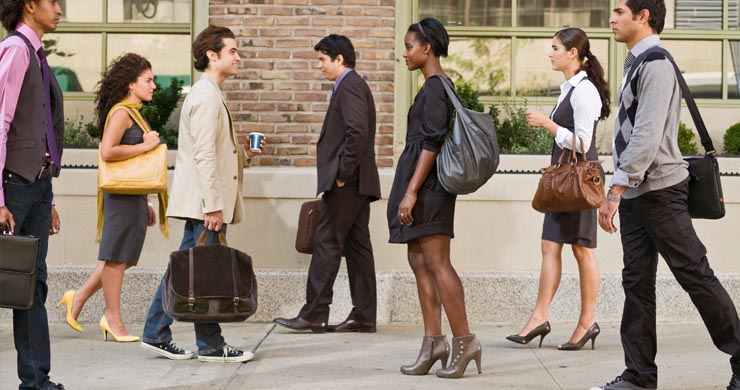Gold star awards
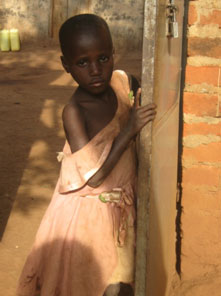
As a new year and a new decade begins in 2010 it is time to think about the targets set by the world at the start of the new millennium. The biggest challenge is to halve poverty around the world by the year 2015!
What are the worlds targets?
The targets are called the Millennium Development Goals. It is the UK's policy that we as a country are committed to the goals. This includes Wales, England, Scotland and Northern Ireland.
Did you know?
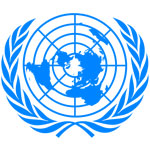
The Millennium Development Goals
In the year 2000, the United Nations set a goal to half the poverty in the World by the year 2015. To achieve this it set 8 targets for each country. Each target was called A Millennium Development Goal. They are:
-
MDG 1: Eradicate Extreme Poverty and Hunger
-
MDG 2: Universal Primary Education
-
MDG 3: Improve Gender Equality and Women Empowerment
-
MDG 4: Reducing Child Mortality
-
MDG 5: Improve Maternal Mortality
-
MDG 6: Combat HIV/AIDS, malaria and other diseases
-
MDG 7: Ensure Environmental Sustainability
-
MDG 8: Global Partnership for Development
Wales takes action!
Yes! Communities across Wales are getting organised to do something about making poverty history. What's more, the world is taking notice of our efforts.
On March the 1st The United Nations will award five new gold stars to groups in Wales who are working with communities in Africa to help them improve their living conditions.
In 2006, the Welsh Assembly Government launched the ‘Wales for Africa’ framework. This has encouraged ordinary Welsh people to get involved and do something about world poverty. Wherever you live in Wales you are just next door to someone who is doing something!
Partnerships in Wales
One partnership featured in the ‘Wales for Africa’ framework is called PONT: Pontypridd Overseas Networking Trust. It is a partnership between Rhondda Cynon Taff in South Wales and a district in Eastern Uganda called Mbale.
When did the partnerships begin?
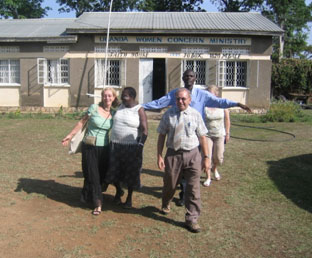
It started in the year 2000 (just like the Millennium Development Goals) when doctor from Pontypridd got together with a group of people who also wanted to help people in Africa. The doctor had already volunteered during the African famine in the 1980s.
Starting with Mbale
In 2002 some volunteers paid for their own tickets and landed in Mbale, Uganda. They made contact with the local people and organisations to find out what they could do to help. To start with the idea was just to link the towns of Pontypridd and Mbale. Soon after, many people all over the Rhondda Cynon Taff wanted to help.
Did you know?
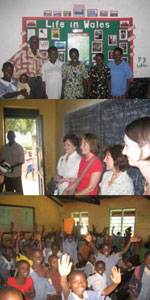
50 primary, secondary and special schools in and around RCT have partnered with schools in Mbale Uganda. Pupils write and teachers carry out exchange visits to observe and teach in each others schools. Here Buwali primary school are learning about Wales from a display put up by their partner school Llanilltud Faerdref Primary School in Llantwit Fardre.
Teachers from RCT visit regularly each year but a main education visit takes place each February during half term in Wales. These 4 teachers came from 3 different primary schools to teach about Wales in Mbale. They taught different lessons. They were amazed that a teacher might have a class of 80 children or more. Uganda has only recently introduced free primary education for all and there is still a shortage of classrooms and teachers in the schools.
Where is Mbale?
Uganda is a country in East Africa. Until 1962 Uganda was part of the British Empire. In the early 1960s Uganda was developing very well and the Ugandan people looked forward to a bright future.
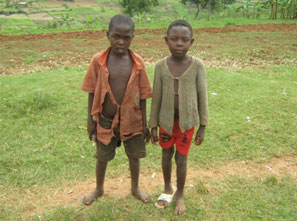
In 1966, the Prime Minister Milton Obote took power and became a dictator. Obote was overthrown by Idi Amin in 1966, but regained power in 1980. These years were a disaster for Uganda – Amin killed at least 250,000 people and Obote killed an estimated 300,000 (Some sources suggest that between them they actually killed 800,000 people). Between them they left Uganda as one of the poorest countries in the world.
The road to recovery for Uganda began in 1986 when President Yoweri Museveni took power and since then has slowly and sensibly overseen a return to democracy
Today, there is still a civil war in the North of Uganda and cross border fighting with its neighbour the Democratic Republic of Congo. However, under good government Uganda’s economic growth is way above the average for the surrounding region and Uganda is likely to achieve Millennium Development Goals 1, 2, 3, 6, 7 & 8. At present only goals 4 & 5 seem likely to be missed.
Activities
Wherever you live you school or community is going to have a link with somewhere in Africa. Try to find out about that community and what life is like there. Can you think of a way that you or your class could do something to help your linked community achieve part of a Millennium Development Goal.
Across Wales thousands of ordinary school children are doing just that! Why not you as well?
